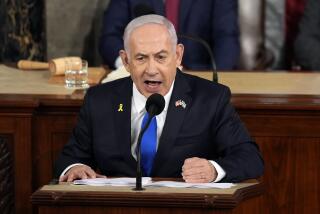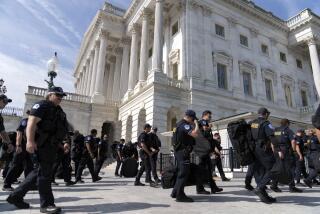Much of the Skepticism Among Lawmakers Appears to Buckle
- Share via
WASHINGTON — Regardless of how Secretary of State Colin L. Powell’s argument against Iraq fares in the United Nations, it appeared Wednesday to shore up support for the Bush administration’s hawkish policy among several members of Congress previously skeptical of what they had termed a rush to war.
“I no longer think inspections are going to work,” Sen. Dianne Feinstein (D-Calif.) told reporters after Powell’s presentation to the U.N. Security Council. She said war could be avoided only if Iraqi President Saddam Hussein reverses course and begins actively complying with U.N. demands that he disarm.
Senate Minority Leader Tom Daschle (D-S.D.) said Powell “made a powerful, methodical and compelling presentation” likely to build an international coalition to disarm Hussein.
And Sen. John F. Kerry (D-Mass.), a contender for his party’s 2004 presidential nomination, said, “If Saddam Hussein does not disarm, he will have chosen to make regime change the ultimate weapons enforcement mechanism.”
Each of these Democrats backed the resolution Congress approved in October authorizing President Bush to use military force against Iraq if diplomacy failed. Yet all three voiced varying degrees of skepticism in recent weeks about administration policy.
Feinstein, for instance, said after Bush’s State of the Union address last week that she remained unpersuaded about the need for a U.S.-led war.
Much of that skepticism appeared to buckle Wednesday under the weight of Powell’s U.N. remarks, which were buttressed by satellite images of suspected Iraqi weapons sites, clandestine recordings of conversations among Iraqi officers and other intelligence.
“This was probably the most evidence-packed speech I’ve ever heard,” Feinstein said.
Some centrist Republicans also said Powell had assuaged their concerns. Sen. Susan Collins (R-Maine) said Powell put forward “extraordinarily strong evidence -- I would say proof” of Iraqi attempts to maintain a cache of weapons of mass destruction in defiance of U.N. resolutions.
Even antiwar Democrats conceded that Powell had put forth strong arguments for action. Sen. Richard Durbin (D-Ill.) called the presentation “compelling.”
But he also said the administration has “not made the case in my mind that war is the only recourse.”
Sen. Edward M. Kennedy (D-Mass.), another critic of administration policy, credited Powell for a “strong case.” But he also called on Bush to explain strategies for a potential invasion of Iraq and its postwar governance, and to tell the public how many military and civilian lives could be at risk in the event of war.
Kennedy has been arguing for a new debate in Congress before any military action.
But such views are getting crowded out by a bipartisan desire among many in Congress to close ranks with the president.
Kerry’s statement was telling: “With such strong evidence in front of them, it is now incumbent on the U.N. to respect its own mandates and stand up for our common goal of either bringing about Iraq’s peaceful disarmament or moving forward with the decisive military victory of a multilateral coalition.”
Other Democrats in Congress vying for the nomination to oppose Bush next year -- Rep. Richard A. Gephardt (D-Mo.) and Sens. Joseph I. Lieberman (D-Conn.) and John Edwards (D-N.C.) -- also issued statements of support.
Among prominent declared Democratic candidates, only former Vermont Gov. Howard Dean and political activist Al Sharpton of New York spoke forcefully against the push toward war.
“I heard little today that leads me to believe that there is an imminent threat warranting unilateral military action by the United States against Iraq,” Dean said after Powell’s speech.
*
Times staff writer Janet Hook contributed to this report.
More to Read
Get the L.A. Times Politics newsletter
Deeply reported insights into legislation, politics and policy from Sacramento, Washington and beyond. In your inbox twice per week.
You may occasionally receive promotional content from the Los Angeles Times.










